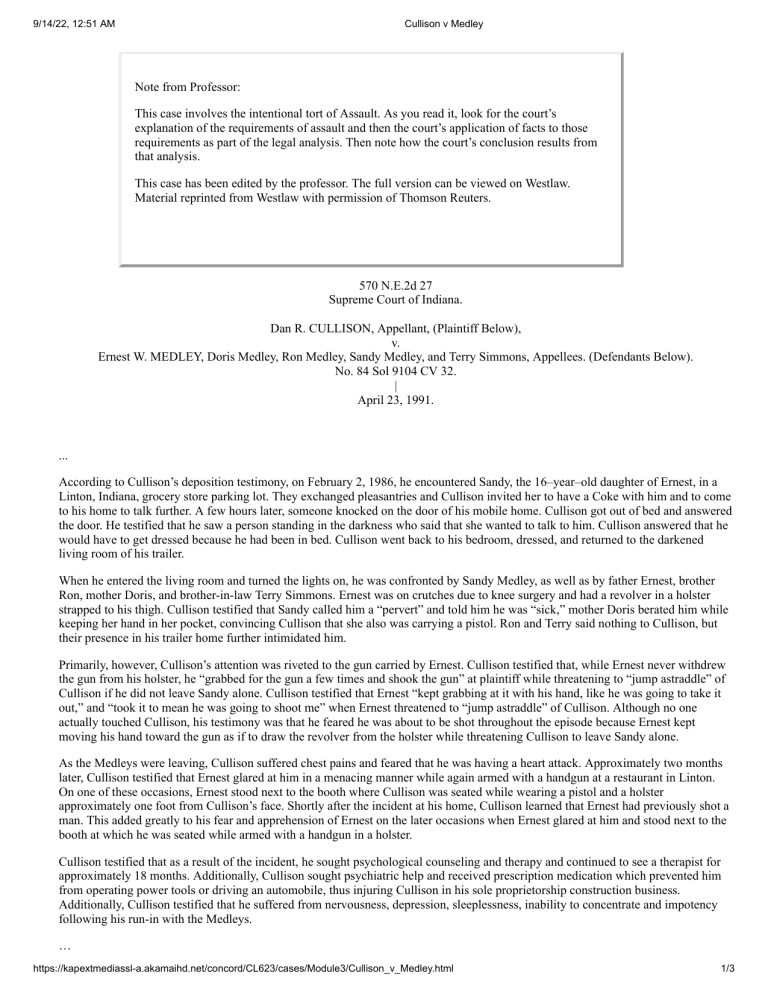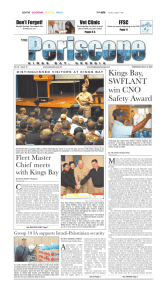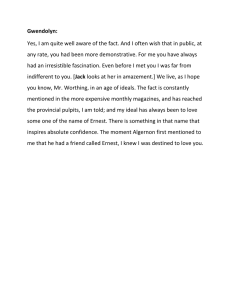
9/14/22, 12:51 AM Cullison v Medley Note from Professor: This case involves the intentional tort of Assault. As you read it, look for the court’s explanation of the requirements of assault and then the court’s application of facts to those requirements as part of the legal analysis. Then note how the court’s conclusion results from that analysis. This case has been edited by the professor. The full version can be viewed on Westlaw. Material reprinted from Westlaw with permission of Thomson Reuters. 570 N.E.2d 27 Supreme Court of Indiana. Dan R. CULLISON, Appellant, (Plaintiff Below), v. Ernest W. MEDLEY, Doris Medley, Ron Medley, Sandy Medley, and Terry Simmons, Appellees. (Defendants Below). No. 84 Sol 9104 CV 32. | April 23, 1991. ... According to Cullison’s deposition testimony, on February 2, 1986, he encountered Sandy, the 16–year–old daughter of Ernest, in a Linton, Indiana, grocery store parking lot. They exchanged pleasantries and Cullison invited her to have a Coke with him and to come to his home to talk further. A few hours later, someone knocked on the door of his mobile home. Cullison got out of bed and answered the door. He testified that he saw a person standing in the darkness who said that she wanted to talk to him. Cullison answered that he would have to get dressed because he had been in bed. Cullison went back to his bedroom, dressed, and returned to the darkened living room of his trailer. When he entered the living room and turned the lights on, he was confronted by Sandy Medley, as well as by father Ernest, brother Ron, mother Doris, and brother-in-law Terry Simmons. Ernest was on crutches due to knee surgery and had a revolver in a holster strapped to his thigh. Cullison testified that Sandy called him a “pervert” and told him he was “sick,” mother Doris berated him while keeping her hand in her pocket, convincing Cullison that she also was carrying a pistol. Ron and Terry said nothing to Cullison, but their presence in his trailer home further intimidated him. Primarily, however, Cullison’s attention was riveted to the gun carried by Ernest. Cullison testified that, while Ernest never withdrew the gun from his holster, he “grabbed for the gun a few times and shook the gun” at plaintiff while threatening to “jump astraddle” of Cullison if he did not leave Sandy alone. Cullison testified that Ernest “kept grabbing at it with his hand, like he was going to take it out,” and “took it to mean he was going to shoot me” when Ernest threatened to “jump astraddle” of Cullison. Although no one actually touched Cullison, his testimony was that he feared he was about to be shot throughout the episode because Ernest kept moving his hand toward the gun as if to draw the revolver from the holster while threatening Cullison to leave Sandy alone. As the Medleys were leaving, Cullison suffered chest pains and feared that he was having a heart attack. Approximately two months later, Cullison testified that Ernest glared at him in a menacing manner while again armed with a handgun at a restaurant in Linton. On one of these occasions, Ernest stood next to the booth where Cullison was seated while wearing a pistol and a holster approximately one foot from Cullison’s face. Shortly after the incident at his home, Cullison learned that Ernest had previously shot a man. This added greatly to his fear and apprehension of Ernest on the later occasions when Ernest glared at him and stood next to the booth at which he was seated while armed with a handgun in a holster. Cullison testified that as a result of the incident, he sought psychological counseling and therapy and continued to see a therapist for approximately 18 months. Additionally, Cullison sought psychiatric help and received prescription medication which prevented him from operating power tools or driving an automobile, thus injuring Cullison in his sole proprietorship construction business. Additionally, Cullison testified that he suffered from nervousness, depression, sleeplessness, inability to concentrate and impotency following his run-in with the Medleys. … https://kapextmediassl-a.akamaihd.net/concord/CL623/cases/Module3/Cullison_v_Medley.html 1/3 9/14/22, 12:51 AM Cullison v Medley II. Assault In count two of his complaint, Cullison alleged an assault. The Court of Appeals decided that, because Ernest never removed his gun from the holster, his threat that he was going to “jump astraddle” of Cullison constituted conditional language which did not express any present intent to harm Cullison and, therefore, was not an assault. Further, the Court of Appeals decided that even if it were to find an assault, summary judgment was still appropriate because Cullison alleged only emotional distress and made no showing that the Medleys’ actions were malicious, callous, or willful or that the alleged injuries he suffered were a foreseeable result of the Medleys’ conduct. We disagree. It is axiomatic that assault, unlike battery, is effectuated when one acts intending to cause a harmful or offensive contact with the person of the other or an imminent apprehension of such contact. Restatement (Second) of Torts § 21 (1965). It is the right to be free from the apprehension of a battery which is protected by the tort action which we call an assault. As this Court held approximately 90 years ago in Kline v. Kline (1901), 158 Ind. 602, 64 N.E. 9, an assault constitutes “a touching of the mind, if not of the body.” Because it is a touching of the mind, as opposed to the body, the damages which are recoverable for an assault are damages for mental trauma and distress. “Any act of such a nature as to excite an apprehension of a battery may constitute an assault. It is an assault to shake a fist under another’s nose, to aim or strike at him with a weapon, or to hold it in a threatening position, to rise or advance to strike another, to surround him with a display of force....” Additionally, the apprehension must be one which would normally be aroused in the mind of a reasonable person. Finally, the tort is complete with the invasion of the plaintiff’s mental peace. The facts alleged and testified to by Cullison could, if believed, entitle him to recover for an assault against the Medleys. A jury could reasonably conclude that the Medleys intended to frighten Cullison by surrounding him in his trailer and threatening him with bodily harm while one of them was armed with a revolver, even if that revolver was not removed from the its holster. Cullison testified that Ernest kept grabbing at the pistol as if he were going to take it out, and that Cullison thought Ernest was going to shoot him. It is for the jury to determine whether Cullison’s apprehension of being shot or otherwise injured was one which would normally be aroused in the mind of a reasonable person. It was error for the trial court to enter summary judgment on the count two allegation of assault. This material was reprinted from Westlaw with permission of Thomson Reuters. https://kapextmediassl-a.akamaihd.net/concord/CL623/cases/Module3/Cullison_v_Medley.html 2/3 9/14/22, 12:51 AM Cullison v Medley https://kapextmediassl-a.akamaihd.net/concord/CL623/cases/Module3/Cullison_v_Medley.html 3/3

